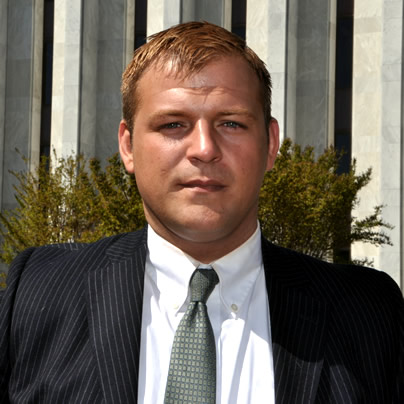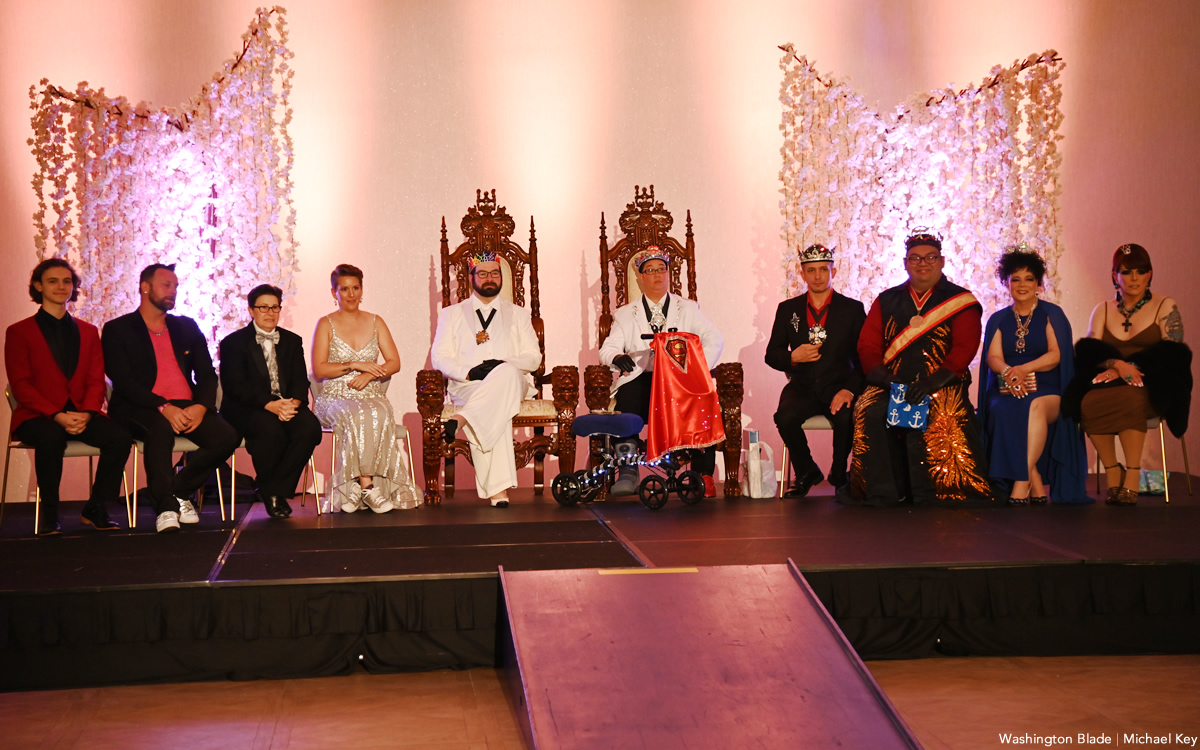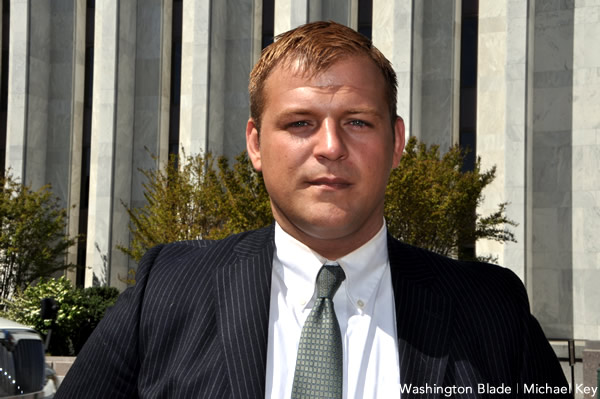Local
U.S. Attorney challenges use of civil rights law
Government defends Library of Congress in firing of gay employee

The United States Attorney for the District of Columbia filed court papers on Dec. 17 arguing that a gay man, who sued the Library of Congress for firing him because of his sexual orientation, failed to show he’s entitled to protection under Title VII of the U.S. Civil Rights Act of 1964.
The court filing by U.S. Attorney Ronald C. Machen Jr., who was appointed by President Obama, places the Obama administration in the awkward position of opposing a gay discrimination claim under Title VII.
In a lawsuit filed against the Library of Congress in August 2012, former management analyst Peter TerVeer, 30, says he was fired from his job after being harassed and humiliated for more than a year by a supervisor who repeatedly quoted biblical passages condemning homosexuality.
The lawsuit charges that although TerVeer was targeted because he’s gay, he suffered employment discrimination and harassment based on his gender, gender stereotyping and his religious beliefs, which he says didn’t conform to those of supervisor John Mech.
Title VII of the famed 1964 Civil Rights Act bans discrimination based on race, religion, ethnicity, gender and, according to recent court rulings, gender identity, but not sexual orientation by itself.
According to the lawsuit, TerVeer and Mech had a cordial working relationship from the time TerVeer was hired in February 2008 as a management analyst in the library’s Auditing Division. It says TerVeer received high performance ratings and two promotions between 2008 and 2010.
The lawsuit says Mech allegedly became hostile and unfairly critical of TerVeer’s work performance and created an unbearably hostile work environment after Mech learned TerVeer was gay.
The government’s filing of a motion to dismiss the case on legal and procedural grounds comes at a time when gay rights attorneys are seeking to persuade courts to treat anti-gay discrimination as a form of sex discrimination protected under Title VII.
“We believe that the allegations in the complaint are insufficient to substantiate a Title VII claim,” said Charles Miller, a spokesperson for the Justice Department’s Civil Division.
Miller pointed to an April 2012 ruling by the Library of Congress’s in-house equal employment opportunity division, which investigated TerVeer’s allegations of discrimination and harassment and dismissed an in-house complaint he filed in September 2011 on grounds that the allegations could not be substantiated.
“The Executive Branch is of course opposed to discrimination on the basis of sexual orientation, and this filing does not reflect any contrary policy,” Miller told the Blade.
But Christopher Brown of the D.C. law firm Ackerman Brown, which is representing TerVeer, said the government’s motion to dismiss the case “relies on legal precedent that excludes LGBT employees from protection under Title VII.”
Brown declined to comment further on the government’s arguments, saying TerVeer’s legal team prefers not to comment in detail on pending litigation.
Greg Nevins, supervising attorney for the gay litigation group Lambda Legal Defense and Education Fund, which is monitoring the TerVeer case, said the government’s motion to dismiss appears to be arguing that TerVeer did not present sufficient evidence to show that his supervisor targeted him for discrimination because TerVeer displayed mannerisms or behavior of a stereotypical gay man, which some might view as being effeminate.
“I think what the U.S. Attorney is saying here is a masculine gay man or a feminine lesbian would not be covered under Title VII,” Nevins said. “Some court rulings have essentially said Title VII does not apply to sexual orientation.”
In a landmark ruling last April, the U.S. Equal Employment Opportunity Commission declared that transgender people are protected against job discrimination under Title VII because bias against their gender identity is equivalent to sex discrimination. The EEOC ruling followed several appeals court decisions holding that transgender people were protected under Title VII.
Lambda Legal and other LGBT advocacy organizations say they hope to persuade courts that gay men and lesbians enjoy Title VII protections. They argue that sexual orientation discrimination is also linked to gender role stereotyping and bias, regardless of whether the victim is perceived as masculine or feminine.
TerVeer’s lawsuit says he also was targeted for retaliation after he filed his discrimination complaint with the library’s in-house EEO office, which is known as the Office of Opportunity, Inclusiveness and Compliance.
“Plaintiff’s discrimination and retaliation claims fall short,” Machen and two other government attorneys argue in their Dec. 17 motion seeking to dismiss the case, which was filed in U.S. District Court for the District of Columbia.
“Plaintiff alleges that he was subject to harassment after his employer learned that he was gay, and he presents his claim as one of non-conformity with sex stereotypes,” the motion to dismiss says. “But the detailed allegations in the complaint do not provide what courts have held is required to show that sex stereotyping was the cause of his employer’s actions.”
The motion to dismiss adds, “[C]ourts have generally required plaintiffs to set forth specific allegations regarding the particular ways in which an employee failed to conform to such stereotypes — generally relating to an employee’s behavior, demeanor or appearance in the workplace — and allegations to support the claim that this non-conformity negatively influenced the employer’s decision … In this case, however, plaintiff fails to offer anything more than the conclusory statement that, as a result of his sexual orientation, ‘he did not conform to the defendant’s gender stereotypes associated with men under Mech’s supervision.’”
One civil rights attorney familiar with the case, who spoke on condition of anonymity, said the U.S. Attorney’s office was fulfilling its role in defending its client — the Library of Congress — and should not be faulted for arguing against TerVeer’s attempt to invoke protection from Title VII.
“The government’s argument that the complainant fails to allege sufficient facts to state a claim … are typical arguments that they’d make equally if the plaintiff were female or black rather than gay,” the attorney said.
The government’s motion to dismiss the case is based mostly on procedural and legal grounds rather than on the merits of TerVeer’s specific allegations of discrimination and retaliation.
The government’s motion cites legal and procedural grounds to seek the dismissal of a separate claim in the lawsuit that the firing violated TerVeer’s Fifth Amendment constitutional right to due process and equal protection under the law.
In addition, it cites procedural grounds to call on the court to dismiss separate claims in the lawsuit that the library violated the Library of Congress Act, which bans discrimination based on factors unrelated to an employee’s ability to perform his or her job; and an internal library policy banning sexual orientation discrimination.
Library investigation finds no substantiation of discrimination
The motion to dismiss releases publicly for the first time the April 26, 2012 ruling by the library’s Office of Opportunity, Inclusiveness and Compliance (OIC) that rejects TerVeer’s allegations on grounds that they could not be substantiated or proven.
The 14-page ruling by the OIC, which was filed in court by the U.S. Attorney’s office as “Exhibit D,” was based on an in-house library investigation into a discrimination complaint filed by TerVeer on Nov. 9, 2011, according to OIC acting supervisor Vicki Magnus.
Magnus discusses the findings in an April 26 letter to Brown, TerVeer’s attorney, which the U.S. Attorney’s office submitted in court as part of Exhibit D.
“Based on the available evidence, the Office of Opportunity, Inclusiveness and Compliance (OIC) does not find sufficient evidence to support Complainant’s allegations that he was discriminated against based on religion, sex, and reprisal, and that he was subjected to sexual harassment and a hostile work environment in his meetings with supervisors regarding performance and in actions taken by supervisors regarding his performance,” Magnus said in her letter.
In what potentially could be damaging to TerVeer’s lawsuit, Magnus notes that the OIC investigation into TerVeer’s discrimination and retaliation complaint included interviews of and testimony by five of TerVeer’s co-workers. Each of the five testified that they personally observed less than satisfactory work performance by TerVeer, according to the OIC ruling.
In his complaint, TerVeer accuses his immediate supervisor, John Mech, and a higher level supervisor, Nicholas Christopher, of giving him a lower job performance rating based on anti-gay bias.
The five co-workers, “each of whom personally observed complainant’s performance, fully support the reasons presented by management justifying their decision to issue complainant poor performance ratings and to deny complainant a [performance based salary increase].”
Brown, TerVeer’s attorney, declined to comment on the OIC ruling or its potential impact on the lawsuit.
The library’s official reason for firing TerVeer was his failure to report to work after a leave of absence he requested and received permission to take had expired. TerVeer told reporters in a news conference in April that his doctor and therapist urged him to take a leave from work after the hostile work environment he said Mech created caused him to suffer severe emotional distress.
He said the library refused to grant his request to be transferred to another office under another supervisor, making it impossible for him to return to work.
District of Columbia
New interim D.C. police chief played lead role in security for WorldPride
Capital Pride says Jeffery Carroll had ‘good working relationship’ with organizers

Jeffery Carroll, who was named by D.C. Mayor Muriel Bowser on Dec. 17 as the city’s Interim Chief of Police, played a lead role in working with local LGBTQ community leaders in addressing public safety issues related to WorldPride 2025, which took place in D.C. last May and June
“We had a good working relationship with him, and he did his job in relation to how best the events would go around safety and security,” said Ryan Bos, executive director of Capital Pride Alliance.
Bos said Carroll has met with Capital Pride officials in past years to address security issues related to the city’s annual Capital Pride parade and festival and has been supportive of those events.
At the time Bowser named him Interim Chief, Carroll had been serving since 2023 as Executive Assistant Chief of Specialized Operations, overseeing the day-to-day operation of four of the department’s bureaus. He first joined the D.C. Metropolitan Police Department in 2002 and advanced to multiple leadership positions across various divisions and bureaus, according to a statement released by the mayor’s office.
“I know Chief Carroll is the right person to build on the momentum of the past two years so that we can continue driving down crime across the city,” Bowser said in a statement released on the day she announced his appointment as Interim Chief.
“He has led through some of our city’s most significant public safety challenges of the past decade, he is familiar with D.C. residents and well respected and trusted by members of the Metropolitan Police Department as well as our federal and regional public safety partners,” Bowser said.
“We have the best police department in the nation, and I am confident that Chief Carroll will meet this moment for the department and the city,” Bowser added.
But Bowser has so far declined to say if she plans to nominate Carroll to become the permanent police chief, which requires the approval of the D.C. City Council. Bowser, who announced she is not running for re-election, will remain in office as mayor until January 2027.
Carroll is replacing outgoing Chief Pamela Smith, who announced she was resigning after two years of service as chief to spend more time with her family. She has been credited with overseeing the department at a time when violent crime and homicides declined to an eight-year low.
She has also expressed support for the LGBTQ community and joined LGBTQ officers in marching in the WorldPride parade last year.
But Smith has also come under criticism by members of Congress, who have accused the department of manipulating crime data allegedly showing lower reported crime numbers than actually occurred. The allegations came from the Republican-controlled U.S. House Oversight Committee and the U.S. Justice Department
Bowser has questioned the accuracy of the allegations and said she has asked the city’s Inspector General to look into the allegations.
Meanwhile, a spokesperson for the D.C. police Office of Public Affairs did not immediately respond to a question from the Washington Blade about the status of the department’s LGBT Liaison Unit. Sources familiar with the department have said a decline in the number of officers currently working at the department, said to be at a 50-year low, has resulted in a decline in the number of officers assigned to all of the liaison units, including the LGBT unit.
Among other things, the LGBT Liaison Unit has played a role in helping to investigate hate crimes targeting the LGBTQ community. As of early Wednesday an MPD spokesperson did not respond to a question by the Blade asking how many officers are currently assigned to the LGBT Liaison Unit.
Arts & Entertainment
2026 Most Eligible LGBTQ Singles nominations
We are looking for the most eligible LGBTQ singles in the Washington, D.C. region.

Are you or a friend looking to find a little love in 2026? We are looking for the most eligible LGBTQ singles in the Washington, D.C. region. Nominate you or your friends until January 23rd using the form below or by clicking HERE.
Our most eligible singles will be announced online in February. View our 2025 singles HERE.
District of Columbia
Imperial Court of Washington drag group has ‘dissolved’
Board president cites declining support since pandemic

The Imperial Court of Washington, a D.C.-based organization of drag performers that has raised at least $250,000 or more for local LGBTQ and non-LGBTQ charitable groups since its founding in 2010, announced on Jan. 5 that it has ended its operations by dissolving its corporate status.
In a Jan. 5 statement posted on Facebook, Robert Amos, president of the group’s board of directors, said the board voted that day to formally dissolve the organization in accordance with its bylaws.
“This decision was made after careful consideration and was based on several factors, including ongoing challenges in adhering to the bylaws, maintaining compliance with 501(c)(3) requirements, continued lack of member interest and attendance, and a lack of community involvement and support as well,” Amos said in his statement.
He told the Washington Blade in a Jan. 6 telephone interview that the group was no longer in compliance with its bylaws, which require at least six board members, when the number of board members declined to just four. He noted that the lack of compliance with its bylaws also violated the requirements of its IRS status as a nonprofit, tax-exempt 501(c) (3) organization.
According to Amos, the inability to recruit additional board members came at a time when the organization was continuing to encounter a sharp drop in support from the community since the start of the COVID pandemic around 2020 and 2021.
Amos and longtime Imperial Court of Washington member and organizer Richard Legg, who uses the drag name Destiny B. Childs, said in the years since its founding, the group’s drag show fundraising events have often been attended by 150 or more people. They said the events have been held in LGBTQ bars, including Freddie’s Beach Bar in Arlington, as well as in other venues such as theaters and ballrooms.
Among the organizations receiving financial support from Imperial Court of Washington have been SMYAL, PFLAG, Whitman-Walker Health’s Walk to End HIV, Capital Pride Alliance, the DC LGBT Community Center, and the LGBTQ Fallen Heroes Fund. Other groups receiving support included Pets with Disabilities, the Epilepsy Foundation of Washington, and Grandma’s House.
The Imperial Court of Washington’s website, which was still online as of Jan. 6, says the D.C. group has been a proud member of the International Court System, which was founded in San Francisco in 1965 as a drag performance organization that evolved into a charitable fundraising operation with dozens of affiliated “Imperial Court” groups like the one in D.C.
Amos, who uses the drag name Veronica Blake, said he has heard that Imperial Court groups in other cities including Richmond and New York City, have experienced similar drops in support and attendance in the past year or two. He said the D.C. group’s events in the latter part of 2025 attracted 12 or fewer people, a development that has prevented it from sustaining its operations financially.
He said the membership, which helped support it financially through membership dues, has declined in recent years from close to 100 to its current membership of 21.
“There’s a lot of good we have done for the groups we supported, for the charities, and the gay community here,” Amos said. “It is just sad that we’ve had to do this, mainly because of the lack of interest and everything going on in the world and the national scene.”
-

 Photos4 days ago
Photos4 days agoThe year in photos
-

 Sponsored3 days ago
Sponsored3 days agoSafer Ways to Pay for Online Performances and Queer Events
-

 District of Columbia2 days ago
District of Columbia2 days agoTwo pioneering gay journalists to speak at Thursday event
-

 a&e features2 days ago
a&e features2 days agoQueer highlights of the 2026 Critics Choice Awards: Aunt Gladys, that ‘Heated Rivalry’ shoutout and more



















